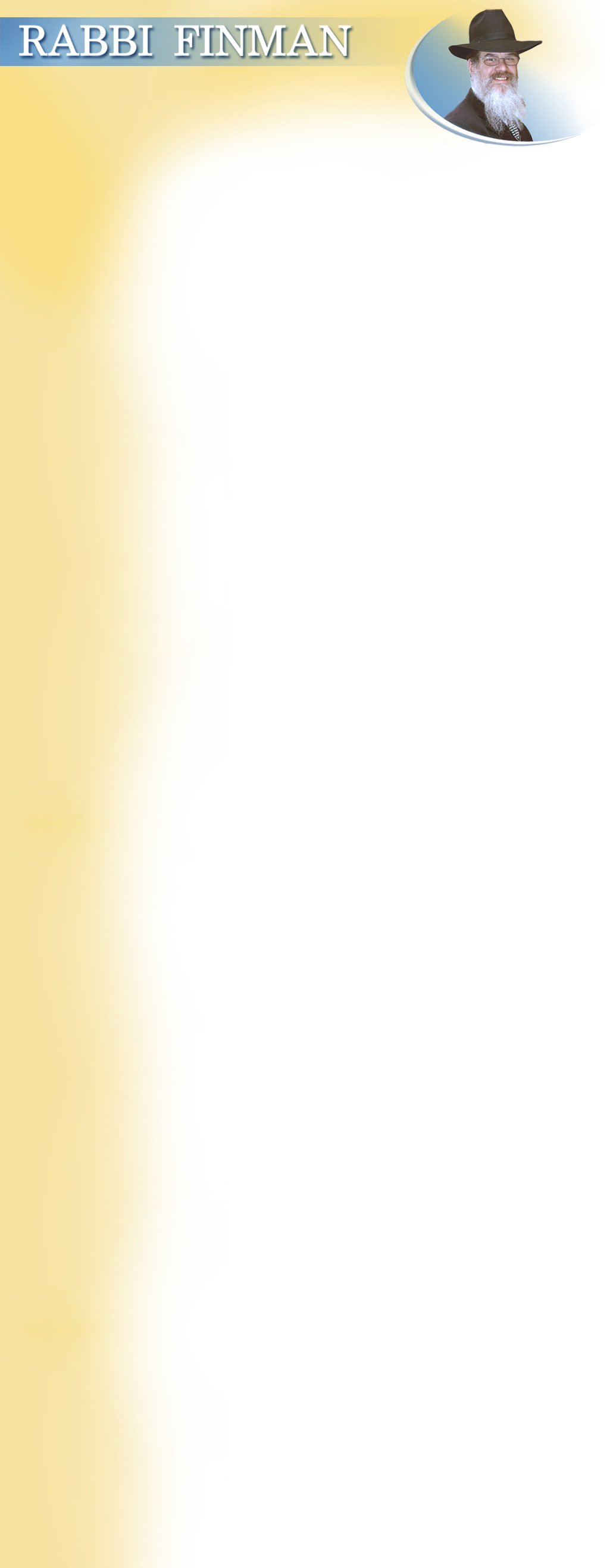








Back in 1996, Rabbi Finman was asked to speak to the niece of one of his students. After spending many hours answering her questions, the woman gave Rabbi Finman her e-mail address. Rabbi Finman wrote the woman a note and included in it a short insight into that week's Parsha and a short Chasidic story.
Realizing that this was something no one was yet doing,, Rabbi Finman sent the missive to his mailing list of about 30 people. Requests from recipients friends came pouring in. The next week Rabbi Finman sent the e-Parsha to 100 people. Within a year more than 2000 people were receiving it. Today, more than 14,000 receive the e-Parsha weekly and the requests keep coming in.
Titsaveh 5786
Terumah 5786
Mishpatim 5786
Yisro 5786
Beshalach 5786
Titsaveh 5786
Please click on the link below to receive the e-Parsha in the way cool HTML version right to your inbox. http://visitor.constantcontact.com/d.jsp?m=1103523647591&p=oi
YouParsha for Teruma https://www.youtube.com/watch?v=I7d1meOD60A The Tachash skins.
====================
This week's YouParsha Titsaveh http://www.youtube.com/watch?v=092EE1aQ5JQ
Atonement by the High Priest.
===============================
The Parsha of Titsave, Exodus 27:20 - 30:10, discusses the consecration ceremony of the Tabernacle in the desert. Part of the service included loaves of Matzah smeared with oil. Rashi - the classic biblical commentator, explains that the oil was smeared like a Greek chof (X). Rashi could have described the manner of anointing in many ways. Rashi lived in Alsace/Lorraine and very often used French words to explain difficult concepts. The French alphabet has an X, why Greek?
Oil alludes to wisdom. Wisdom refers to the very essence of a concept. Like oil, that quintessential point of wisdom spreads though out every detail of the concept. The Greeks, during their occupation of Judea, were not interested in destroying Jews, but Judaism - the quintessential point of their holiness. They attacked the oil of the Temple, not destroying the oil, but breaking the seals on the jars in an attempt at defiling the "wisdom" of Judaism.
The one jar that remained with the seal of the High Priest intact alludes to Keser - Divine Will, which is higher than wisdom. The Greek plot never reached this jar as Divine will overcomes impure wisdom.
Rashi used the Greek Chof (X) (chof is the abbreviation for keser - Divine will) to indicate that the Jews, through serving G'd and making this world a dwelling place for his Divine Presence, have the ability of extracting the essential spark of holiness, latent in every creature and elevating it to holiness. Even Greek.
===============================
Purim begins next Monday night March 2. The Purim feast highlights the Purim celebration. This meal is to be the most splendid of meals. It should start Tuesday afternoon and continue until after dark (Jewish Ferndale is having such a meal. Contact me for details).
At this meal, it is customary to partake in adult beverages "until one cannot distinguish between blessing Mordechai and cursing Haman." The expression in Hebrew is ďad dílo yadaĒ, until one does not know. Chasidic philosophy defines knowledge as an eternal connection. When one meditates deeply on a concept until they understand and feel the ramifications of that concept; when they are bound and united with that concept, they know it. Knowledge is an intellectual trait. Purim is a time for relating to the Almighty in a supra rational manner.
Hamanís decree was to kill all the Jews in one day. Had any of the Jewish people renounced their Judaism, they would have been spared. No one did. Mordechai organized the largest kids rally ever. Twenty-four thousand children were assembled in the capital city of Shushan. There, Mordechai instilled a deep feeling of Jewish pride. He then instructed the children to go home and instill that feeling in their parents; which they did. The Book of Esther recounts that the Jews did what they had started to do. They started receiving the Torah nearly 800 years earlier. They moved away from it and were exiled to Persia. With intellect aside, they rededicated themselves to Judaism in the days of Mordechai. This could only have been as an expression of the essence of the soul.
At our Purim feast, we are to celebrate not just the vanquishing of our enemies (thereís a joke going around the Internet; Jewish Holidays - We were attacked, we won, letís eat), but the Jewish peopleís ability to relate to G'd in a manner higher than intellect. What we must do at this feast, is go beyond the demands of the intellect, unite ourselves with G'd, who is the source of intellect and become supra intellectual beings.
=========================
Listen Weekly to the Jewish Hour Podcast. www.rabbifinman.com. Now available on iTunes, spotify, audacy, and wherever you park your podcasts.
The Torah e-Parsha is a project of Jewish Ferndale. For information on sponsoring the Torah e-Parsha in memory or for the recovery of a loved one, in honor of a simcha or you just feel like being nice, contact via reply. All contributions are tax deductible. Please forward this message to as many friends and associates as you like. © 2026 by Herschel Finman.
Contact Rabbi Finman for information on sponsoring the e-Parsha
